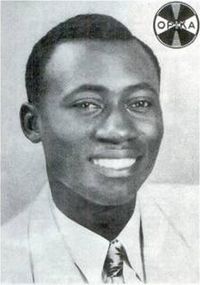Le Grand Kallé facts for kids
Quick facts for kids
Joseph Tshamala Kabasele
Le Grand Kallé |
|
|---|---|

Promotional photo of Kabasele for the Opika record label in the early 1950s
|
|
| Background information | |
| Birth name | Joseph Athanase Tchamala Kabasele |
| Born | 16 December 1930 Matadi, Belgian Congo |
| Died | 11 February 1983 (aged 52) Paris, France |
| Genres | African Rumba |
| Years active | 1953–1983 |
| Labels | Surboum African Jazz |
Joseph Athanase Tshamala Kabasele, famously known as Le Grand Kallé, was a very important singer and bandleader from Congo. He was born on December 16, 1930, in Matadi, which was then called Belgian Congo. He passed away on February 11, 1983, in Paris, France.
Many people call him the "father of modern Congolese music". He led a famous band called Le Grand Kallé et l'African Jazz. With his band, he created many well-known songs, including the hit Indépendance Cha Cha.
Contents
Early Life and Education
Joseph Athanase Tshamala Kabasele was born in Matadi, in a region called Bas-Congo. This area was part of the Belgian Congo at the time. Today, it is known as the Democratic Republic of the Congo.
Kallé came from an important family in Congo. For example, Cardinal Joseph Malula was one of his relatives. He went to secondary school and later became a typist. He worked for different companies in Léopoldville, which was the capital of the Belgian Congo.
Music Career Beginnings
In the early 1950s, Kallé found a chance to start a music career. This happened at a new recording studio named Opika. He teamed up with two guitarists from Opika, Georges Doula and Albert Yamba-Yamba. Together, they formed a small group called Groupe Doula Georges.
In 1951, Doula and his band were featured in a film. This film was made to promote a radio station called Voix de la Concorde. The radio station used the call letters "OTC." To use the fame from the film, the band decided to change their name to OTC.
Forming African Jazz
By 1953, Kallé felt that OTC was not keeping up with new music styles. So, he decided to create his own band. He formed l'African Jazz. Many people believe this band became the most important Congolese group ever.
L'African Jazz was one of the most popular early African Rumba bands. At its best, the band included many famous musicians. These included the amazing guitarist Dr Nico Kasanda and the talented saxophonist Manu Dibango. Great singers like Tabu Ley Rochereau, Sam Mangwana, and Pépé Kallé also joined the group.
In 1960, Le Grand Kallé started his own record label. It was called Subourboum Jazz. This label even released music for Franco Luambo's famous band, TPOK Jazz. Kallé was very smart about business. He made deals with European record companies. This helped make sure his band's music was recorded with high quality. These recordings were then sold to French-speaking audiences.
Later Career and Influence
In the mid-1960s, Kallé faced a big challenge. Two of his talented students, Tabu Ley Rochereau and Dr Nico Kasanda, left his band. They started their own group called Africa Fiesta.
Kallé never fully recovered from this change. Instead, he focused on helping new singers develop their skills. He especially worked with the singer Pépé Kallé.
Political Impact
Le Grand Kallé was a well-known person in the Belgian Congo. Because of his fame, he was chosen to be part of an important meeting. This meeting was called the Congolese Round Table Conference in 1960. Its purpose was to discuss Congo's independence from Belgium.
Kallé also wrote several songs about political topics. Two of his most famous political songs are "Indépendance Cha Cha" and "Table Ronde". These songs helped people feel hopeful about their country's future.
Death and Legacy
Le Grand Kallé passed away in a hospital in Paris, France. This happened on February 11, 1983. He was buried in Gombe Cemetery in Kinshasa, Congo.
Kabasele is remembered as one of the greatest African singers of the 20th century. He was the first musician to mix Cuban rhythms with traditional African beats. This mix created a new style of music now known as Soukous. He was also the first African musician to start his very own record label. Because of his huge impact, he is often called the "Father of Congolese Music."
Selected Albums
- Merveilles Du Passé – Hommage Au Grand Kalle Vol. 2 (1984, African)
- Essous / Kwamy / Mujos / Edo / Casino (1993, Sonodisc)
- Grand Kallé et African Team, Vol. 1 (1993, Grand Kalle/Syllart)
- Grand Kalle et l'African Jazz 1961–1962 (1993, Sonodisc)
- Le Grand Kalle (2013, Le Monde des Artistes)
- Joseph Kabasele, Le Grand Kalle: His Life, His Music (2013, Sterns Africa)
- The History Of Le Grand Kallé, Vol. 1-5 (2013, Diamond Days)
- Butsana Mama: Le Grand Kallé & His Songs, Vol. 1-5 (2013, Supreme Media)
 | Frances Mary Albrier |
 | Whitney Young |
 | Muhammad Ali |

